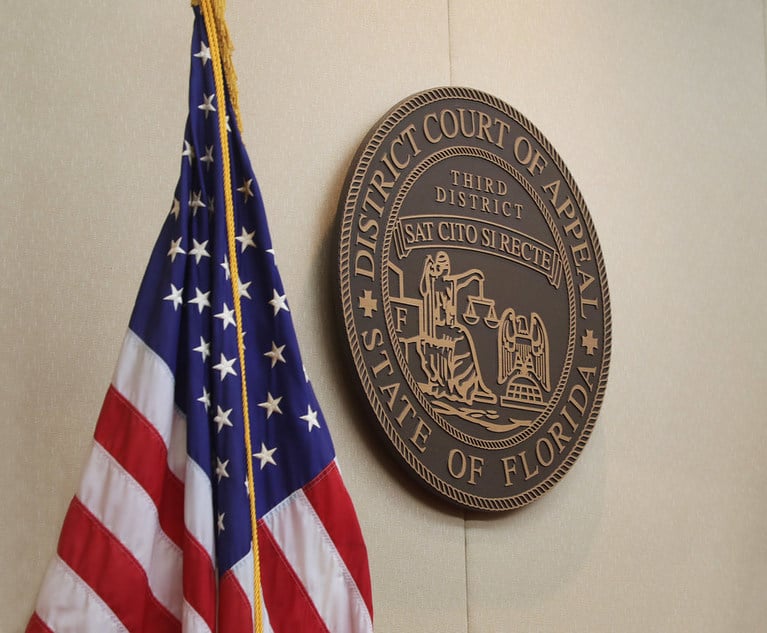 Florida Supreme Court. Photo: Phil Sears.
Florida Supreme Court. Photo: Phil Sears.Court Rules Florida's Next Governor Will Pick 3 New Justices
Florida's next governor will pick three new Supreme Court justices to replace those leaving office on inauguration day.
October 15, 2018 at 02:55 PM
3 minute read
In case voters needed any more reasons to vote, the Florida Supreme Court ruled Monday that the next governor will decide the future of the Florida Supreme Court.
The high court ruled the candidate elected to run the state for the next four years also will be in charge of picking applicants to replace Justices Barbara J. Pariente, R. Fred Lewis and Peggy A. Quince.
The two-page order doesn't specify a vote on the current court. But it says Gov. Rick Scott “exceeded his authority” by setting a Nov. 10 deadline for the court's Judicial Nominating Commission to deliver a list of finalists.
“As the JNC is an independent body, it is not bound by Governor Scott's deadlines,” the court ruled.
Calls to attorneys in the case were not returned by deadline.
Scott claimed the right to name the next three justices, whose terms end on the same day as his. The timing issue has never been formally addressed by the court. A gentleman's agreement between Gov. Lawton Chiles and Gov.-elect Jeb Bush put Quince on the court in 1998 in the last test of the governor's authority.
The 60-day clock set in the Florida Constitution for certifying a list of finalists will start after the new governor takes office, the court ruled.
The high court will take up one unanswered questions in arguments Nov. 8 — when the JNC can certify its list of finalists.
Applications have been submitted under Scott's scenario, but it looks like the next governor — either Republican Ron DeSantis or Democrat Andrew Gillum — will have the power to seek more.
The selections will determine in large part the diversity of the next court. Pariente and Quince are the only women on the court, and Quince is the only African-American justice.
The three outgoing justices are required to leave office by the state's mandatory judicial retirement age of 70. They are considered left of center; Justices Charles Canady, Alan Lawson and Ricky Polston trend conservative; and Justice Jorge Labarga can be a swing vote.
Under the Constitution, Lewis' replacement must come from either Miami-Dade or Monroe counties. The other two new justices can come from anywhere in the state because justices from Pariente's and Quince's home districts are already serving. Pariente and Labarga are from the Fourth District, and Quince and Canady are from the Second District.
Read the document:
Read more:
This content has been archived. It is available through our partners, LexisNexis® and Bloomberg Law.
To view this content, please continue to their sites.
Not a Lexis Subscriber?
Subscribe Now
Not a Bloomberg Law Subscriber?
Subscribe Now
NOT FOR REPRINT
© 2024 ALM Global, LLC, All Rights Reserved. Request academic re-use from www.copyright.com. All other uses, submit a request to [email protected]. For more information visit Asset & Logo Licensing.
You Might Like
View All
Eleventh Circuit Rules for Moms for Liberty in Free Speech Case Against School Board
4 minute read


Eleventh Circuit Upholds Limits on Public Comments During City Council Meetings
5 minute readTrending Stories
- 1The Law Firm Disrupted: Playing the Talent Game to Win
- 2A&O Shearman Adopts 3-Level Lockstep Pay Model Amid Shift to All-Equity Partnership
- 3Preparing Your Law Firm for 2025: Smart Ways to Embrace AI & Other Technologies
- 4BD Settles Thousands of Bard Hernia Mesh Lawsuits
- 5A RICO Surge Is Underway: Here's How the Allstate Push Might Play Out
Featured Firms
Law Offices of Gary Martin Hays & Associates, P.C.
(470) 294-1674
Law Offices of Mark E. Salomone
(857) 444-6468
Smith & Hassler
(713) 739-1250






